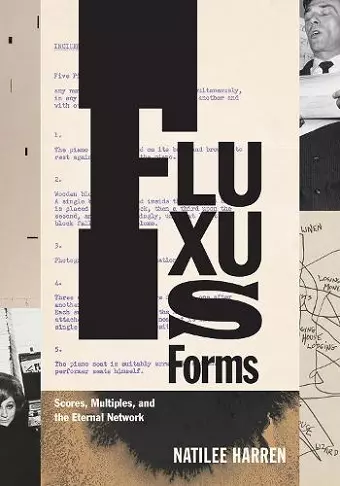Fluxus Forms
Scores, Multiples, and the Eternal Network
Format:Hardback
Publisher:The University of Chicago Press
Published:24th Feb '20
Should be back in stock very soon

"PURGE the world of dead art, imitation, artificial art. . . . Promote living art, anti-art, promote NON ART REALITY to be grasped by all peoples," writes artist George Maciunas in his Fluxus manifesto of 1963. Reacting against an elitist art world enthralled by modernist aesthetics, Fluxus encouraged playfulness, chance, irreverence, and viewer participation. The diverse collective--including George Brecht, Robert Filliou, Dick Higgins, Alison Knowles, George Maciunas, Yoko Ono, Nam June Paik, Benjamin Patterson, Takako Saito, Mieko Shiomi, Ben Vautier, and Robert Watts--embraced humble objects and everyday gestures as critical means of finding freedom and excitement beyond traditional forms of art-making. While today the Fluxus collective is recognized for its radical neo-avant-garde works of performance, publishing, and relational art and its experimental, interdisciplinary approach, it was not taken seriously in its own time. With Fluxus Forms, Natilee Harren captures the magnetic energy of Fluxus activities and collaborations that emerged at the intersections of art, music, performance, and literature. The book offers insight into the nature of art in the 1960s as it traces the international development of the collective's unique intermedia works--including event scores and Fluxbox multiples--that irreversibly expanded the boundaries of contemporary art.
"With this deeply researched and engagingly written book, Harren gracefully erases boundaries between art history and musicology. In the discussion of George Brecht and the event score, she reveals the ambiguous double power of the score: as both action and potential. Over the course of the book she slows down the explosive event of Fluxus just enough to draw the personal and conceptual chain reactions that made the movement into a turning point in twentieth-century art, but she does not lose its FLUX."--Michael Pisaro, California Institute of the Arts "Fluxus took inspiration from music, but not because of its abstract forms or its affective power. Rather, these artists saw potential in music's philosophically powerful technology: the score. Experimental scores enabled Fluxus to provoke audiences with endlessly novel and open-ended linkages between concepts, materials, and forms. Harren's tour-de-force narrative dramatically reframes the way we understand the cross-fertilization of the postwar avant-garde."--Michael Gallope, author of Deep Refrains: Music, Philosophy, and the Ineffable "From Byzantine studies to theories of representation in the digital age, a wave of historical and critical thinking is now devoted to questions surrounding the identity of the artwork and the status of the object. Harren's remarkable book is a deep dive into the intermedial history of Fluxus from that vantage. Grounded in an intensive examination of means, her account brings new clarity to the terms of a practice that, long elusive, emerges in her hands as utterly indispensable to a historical and conceptual investigation of the ontology of art."--Jeffrey Weiss, curator and critic "What a terrific book! Fluxus Forms is beautifully written, lovingly detailed, intelligent, groundbreaking, and will be a field-defining text for many years. Nuanced and muscular in both argument and prosody, the book presents a long overdue formal and critical analysis of Fluxus. It is Harren's insistence on the variabilities, the very fluxiness, of the virtual and its attentive materializations in the actual that is at the heart of this historical account. Showing an intimate knowledge of the material, her exegesis of the diagrammatic aspect of Fluxus complicates and deepens the urgency of this work today. The enormous value of this project is its eschewal of a general theory in favor of a working theory--a brilliant diagramming, in fact--of something that 'refuses to work.'"--Judith Rodenbeck, author of Radical Prototypes: Allan Kaprow and the Invention of Happenings "Fluxus Forms offers an original perspective by focusing on the diagram and the musical score as key components of Fluxus. In shaping her discussion of Fluxus around the idea of 'artworks in flux, ' Harren opens up connection between the abstract and the concrete. Using Andreas Huyssen's idea that Fluxus is the 'master code of postmodernism, ' she presents the movement with fresh eyes and reveals how the collective's multisensory engagement with the debris of capitalist production--found in the form of Fluxus boxes as well as the notational objects that link things and events--functions as instructional signposts for a newly imagined postindustrial politics that avoid commoditization of the art spectacle."--Hannah Higgins, author of Fluxus Experience
ISBN: 9780226354927
Dimensions: unknown
Weight: unknown
304 pages